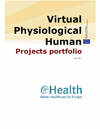This resource book provides an overview of the set of Virtual Physiological Human (VPH) research projects managed by the ICT for Health unit of the Information Society and Media General Directorate, which are funded under the 6th and 7th (FP6 - FP7) framework Programme for Research and Development. At the core of the VPH lies the idea of translating all functions of the human body into a coherent set of multi-scale computer models. The scales of modelling span spatially from the whole body down to the cells and the proteins they synthesise, and temporally from years to microseconds. The VPH framework will provide ICT tools for developing patient-specific computer based models and simulations using specific patient data allowing for personalised and predictive healthcare. These multi-scale models will be used to develop an integrative approach to predicting the risk in developing a disease and to improving the diagnosis and treatments of these diseases. During drug development, such organs models could be used to assess the drug effect on a specific population.
Download Virtual Physiological Human Projects Portfolio (.pdf, 3.433 KB).
Download from eHealthNews.eu Portal's mirror: Virtual Physiological Human Projects Portfolio (.pdf, 3.433 KB).

